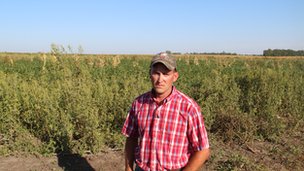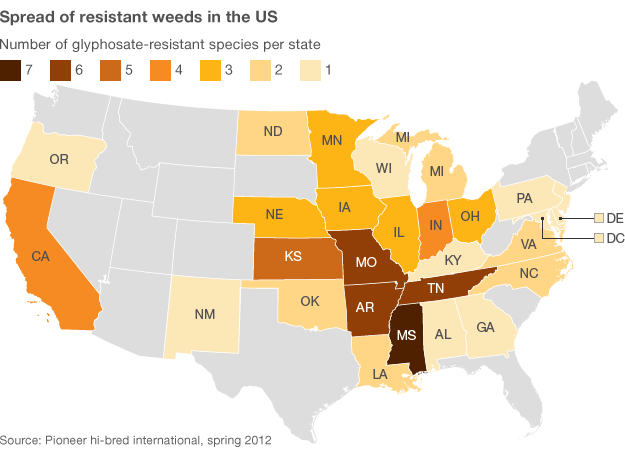*GG*
senior member
- Messages
- 6,389
- Location
- Concord, NH

Welcome to Phoenix Rising!
Created in 2008, Phoenix Rising is the largest and oldest forum dedicated to furthering the understanding of, and finding treatments for, complex chronic illnesses such as chronic fatigue syndrome (ME/CFS), fibromyalgia, long COVID, postural orthostatic tachycardia syndrome (POTS), mast cell activation syndrome (MCAS), and allied diseases.
To become a member, simply click the Register button at the top right.
Agent Orange chemical in GM war on resistant weeds
By Matt McGrath Science reporter, BBC World Service
Farmers all over the US are facing a growing challenge from weeds that are resistant to chemical sprays
Continue reading the main story
Related Stories
A US biotechnology company is set to introduce a controversial new genetically modified corn to help farmers fight resistant weeds.
Dow Agrosciences says its new GM product is based on a chemical that was once a component of the Vietnam war defoliant, Agent Orange.
It is needed they say because so called "superweeds" are now affecting up to 15 million acres of American crops.
Continue reading the main story
“Start Quote
If we utilise the technology too extensively and rely on it too exclusively, eventually we will develop resistance”End Quote Prof Dallas Peterson Kansas State University
Dow argues the new approach is safe and sustainable.
For a farmer like Jeremy Leech who grows corn and soybeans near Humboldt, Nebraska, resistant weeds are a constant threat to his farm and his family.
Last year he spent around $7,500 on chemical sprays to combat the threat to his crops.
The herbicide failed to kill the giant ragweed that had grown on his land, strangling his soybeans and his income. Worse, the pungent pollen from the towering pests exacerbated his eight year-old daughter's asthma.
"When that stuff is pollinating it makes it hard for her to breathe outside and when you live on a farm you know the kids play outside all the time and they love it and when that pollen gets really bad she gets choked up," he says.
Farming revolution
Thousands of farmers across the US now face similar problems with weeds that can withstand powerful herbicides. Scientists say it is because of the success of GM crops that were introduced in the mid 1990s.
Monsanto became a world leader in the field thanks to the introduction of Roundup-ready corn and soybeans. These crops were engineered to be able to survive spraying with glyphosate, a chemical marketed as Roundup.
Jeremy Leech has battled resistant weeds on his Nebraska farm.
Farmers just needed to use this one spray on their fields and it killed all the weeds but left the crops intact. Growers rapidly adopted the new technology as it cut their costs substantially.
"Roundup was the one that was supposed to do wonders," says Jeremy Leech's father, Van.
"And it did for the first few years; anybody could raise clean beans. Obviously over the last few years, bean fields are beginning to look more and more like this," he says, pointing to a field where weeds tower over shrunken crops.
To see how bad the weed problem can get, I travelled to an experimental plot near David City run by the University of Nebraska with Prof Stevan Knezevic.
We stand in a cornfield surrounded by towering green plants. But there is not an ear of corn in sight. The stalks that surround us are Giant Ragweed, one of the "dirty dozen" weeds that have acquired resistance to Roundup.
Harvesting corn on the Leech farm in Nebraska
So powerful have these monster weeds become become that even spraying them with 24 times the recommended dose of Roundup fails to kill them.
These plants suck the light and the life from the crops. Just one resistant weed every 10 square metres can reduce the yields from productive plants by 50%.
"Over the past 15 years I said that if we continued using roundup, roundup roundup, we're going to have a problem - now we have that problem," says Prof Knezevic.
"The reason why we are here is that we all mismanaged this technology."
Back to the future
Recognising the scale of the problem, the biotechnology industry believes that newer more effective forms of GM are the solution. Dow Agrosciences is now seeking US government approval for the Enlist weed control system.
Instead of the crop being resistant to one chemical, it is engineered to resist two. Dow says this is a more effective solution because it allows farmers to mix and match their sprays more effectively, making for a far more sustainable system.

What is causing controversy though is the new trait which makes the crops resistant to a chemical called 2,4-D. Developed by a British team during the war, this powerful weed killer was a component part of Agent Orange, the defoliant used extensively by the US Army during the Vietnam war.
2,4-D is currently utilised as a herbicide in agriculture, though it is used sparingly compared with Roundup. The change here would expand options for farmers to use 2,4-D.
Although it was is one of two chemical ingredients in Agent Orange, the chemical was not implicated in causing the devastating health impacts suffered by many people exposed to the defoliant.
Continue reading the main story
Alternative approaches

- Bright orange flames shoot from the back of a propane powered weed burner as it trundles slowly across a field. This is a modern demonstration at the University of Nebraska of an old technique
- According to the university's Prof Stevan Knezevic, around 70,000 farming families in the US used flaming as their main defence against weeds in the 1950s
- The device is still popular with organic farmers who have few chemical sprays that they can utilise. But according to Dr Knezevic the rise of weed resistance is increasing interest from conventional farmers as well
- This prototype can concentrate flames at temperatures up to 1,100C, sufficient to kill most weeds
- "Any weeds that come from a seed, you can smoke it... Literally," says Prof Knezevic
Prof Dallas Peterson of Kansas State University who has co-operated with Dow in the past says this makes the chemical very suitable for working in combination with others.
"It is an old herbicide, one of the oldest synthetic herbicides around; we've used it for over 50 years in many different situations and to quite a large degree, and we haven't had many cases of resistance develop yet," he explains.
The US Environmental Protection Agency says that 2,4-D is safe for use in farming. The Department of Agriculture is expected to shortly grant final approval for planting next spring.
But weed scientists are concerned that if farmers are not educated to use the new GM product properly, resistance issues will soon re-appear.
"It will certainly help with weed resistance; it's a new mode of action," says Prof Dallas Peterson.
"But it's not a silver bullet - and if we utilise the technology too extensively and rely on it too exclusively, eventually we will develop resistance."
Back on the farm in southeastern Nebraska, Jeremy Leech is carefully cleaning his combine harvester to make sure he does not transport resistant seeds from one field to the next. He is also sceptical that a new GM alone is the answer.
"To me, it's a short-term fix. I think 2,4-D will work fine, but what I'm afraid is what's going to happen 4-5 years down the road if we keep using it. I think we 'll have the same problems we have now with Roundup."

These giant ragweeds have grown tall despite the application of herbicide
What is emerging from Dow and other biotech companies in this field is the growing acceptance that greater education of farmers and a more comprehensive approach to weed management are crucial to the success of their products.
"When we grow Roundup-ready corn and rotate it with Roundup-ready soybeans the biodiversity is out of the window," says Prof Knezevic.
"It's just two crops, same chemical. We need more biodiversity if the biotech bandwagon is to succeed, like the organic farmers who rotate their crops more."
Ironically, the future of GM may well depend on re-incorporating some of the older skills that the technology once threatened to replace.